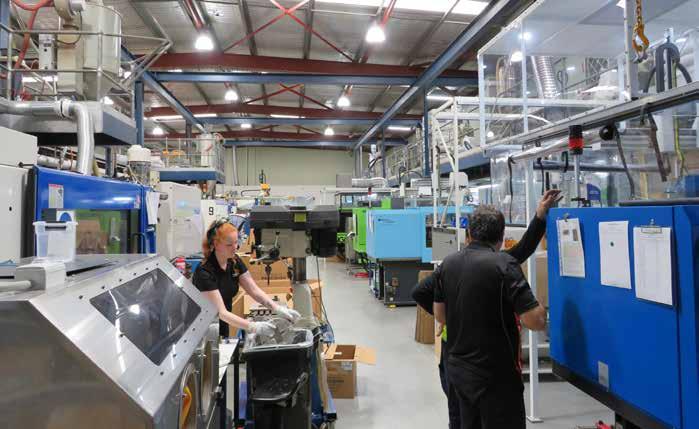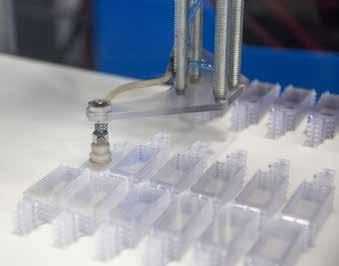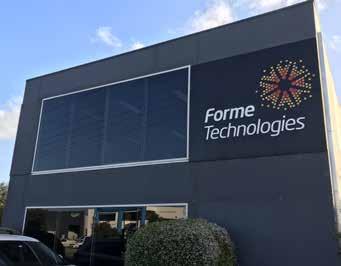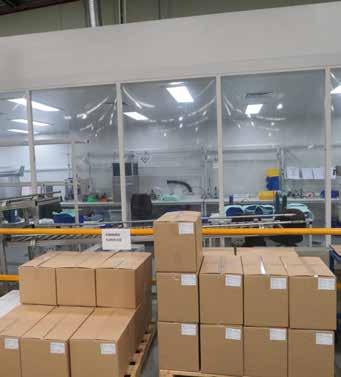
14 minute read
COMPANY FOCUS
from AMT AUG/SEPT 2020
by AMTIL
Forme Technologies – Breaking the mould Originally set up as a ‘Mom-and-Pop’ business producing relatively standard plastic components, Forme Technologies has managed an impressive transition to become an advanced manufacturing company offering innovative solutions and specialist expertise for clients in highly demanding sectors. By William Poole.
Forme Technologies has invested heavily in state-of-the-art machinery and in automating its production processes.
The company that would eventually become Forme Technologies started life in the early 1990s, when Charles Land established CL Plastics in Melbourne’s south-east suburbs. For its first decade in business the company achieved a solid degree of success as a contract manufacturer of plastic components. In the mid-2000s it was acquired by the Anderson family investor group, with Mirko Tappero appointed as General Manager shortly after that. Since then the business has undergone a significant modernisation process, as well as a name change. “The company started out as a nicely run ‘Mom-and-Pop’ sort of organisation, and I think we’ve turned it into a fairly sizable player in the industry,” says Tappero. “We’ve spent a lot of money on automation, mechanisation, streamlining processes and just getting smarter about how we do things. Our biggest investment over the last five or six years has been very modern machinery, coupled with a lot of automation. That’s probably the biggest way the organisation has changed.” Today Forme operates out of three factories, all within walking distance in Carrum Downs – a fourth site, next door to the head office, is due to commence operations later this year (more on that later). While it nowadays employs a team of around 30 staff, its extensive investments in technology have seen a drop in the number directly involved on the shopfloor. “When we took this thing on, we had eight machines on the floor and we employed about 14, maybe 16 people out on the factory floor,” Tappero adds. “Today we’ve got 12 machines and five people on the floor, purely by virtue of automation. It’s gone from a lot of people on a few machines to very few people on a whole bunch of machines.” As well as upgrading and automating its processes, Forme also has a fully equipped clean room, and recently it installed its own tool room; while most of its production tooling is sourced externally, this new facility allows it to undertake more prototyping and product development work in-house. “We’ve put in a small but nicely sophisticated tooling facility of our own, which means we can hop in and out of there as and when we see fit. It’s been one of the absolute best things we’ve done.” All these efforts to enhance the company’s technical capabilities haven’t been undertaken without a broader ambition in mind. While plastics remains at the core of everything it does, Forme has spent the last few years carving out a distinct niche for itself as an advanced manufacturing business specialising in providing comprehensive design and engineering solutions, and the manufacture of sophisticated, high-precision plastic components. “Historically, we were pretty much a ‘me too’ sort of organisation,” says Tappero. “Somebody came to us with a piece they wanted moulded, and we converted it into a piece of plastic. These days we’re getting involved more at the conceptual level, working with people who have designs or ideas in mind, and literally taking it from a concept, through prototyping, through all the engineering levels, and finally the piece of plastic that pops out at the end. We’ve invested heavily in engineering skillsets just to be able to play at that level.” Today the company services a broad array of clients across some of the most demanding manufacturing sectors. Medical accounts for a key part of Forme’s business. Another major area is in the manufacture of housings and encapsulations for electronics, though this goes beyond simple moulded parts on which circuitry can be mounted – for example, Forme was recently closely involved in the design and development of a helipad landing light, a product with an exacting set of specifications in terms of loads, impacts, weathering and so on. The company does still take on a certain amount of less sophisticated work as well, though Tappero stresses this is more out of necessity than choice: “Being an Australian company, you’ve got to do what you can to keep the doors open. So we’ve got the odd job that we probably don’t like doing but we have to. We’ve got a little bit of the ‘rats-and-mice’ stuff. But we try not to play that game as much as possible; we don’t do buckets and basins and bottletops. Even CL Plastics never lived in that space. It always had a portfolio of products that was above the ‘rats-and-mice’ stuff.” In the last couple of years the team’s expertise in materials means metal replacement has been a big part of its activities, taking components typically made from aluminium and converting them into plastic, with all the engineering challenges that come with that.
Forme Technologies specialises in extremely high levels of precision. These devices, used in cancer diagnostics and research, are manufactured to within seven microns straightness from edge to edge, a distance of about 50mm.


Forme Technologies’ headquarters is based in Carrum Downs, Victoria.
“I think what would probably define us is our use of some really, really exotic materials,” says Tappero. “There’s quite a few that as far as we know we’re the only users in the country. And we’re progressing more and more into solutions providers rather than just plastics providers.” Medical grade Like many Australian manufacturers, Forme Technologies had been quite heavily involved in the automotive sector, though Tappero and his team were quick to anticipate the closure of the Australian carmakers, and they began planning their diversification well in advance. While this saw the company seek opportunities in a range of markets, the medical sector is the one where it has really found its niche. Tappero estimates medical makes up as much as 60% of the company’s business, and it’s an area where further growth is being actively pursued. Forme boasts a long record of developing innovative products and solutions for the medical sector, from a resuscitation kit that features a non-contact mouthpiece mask, to an electronic device that enables CPR (cardiopulmonary resuscitation) to be administered in a precise way that does not endanger the patient. The company also runs a subsidiary, Forme Medical, which produces its own product line of patient-lifting and patient-positioning devices. Tappero explains: “Anything that you sit on for physio, proctology, gynaecology, urology – all those sorts of things, we make devices for. We don’t focus on the run-of-the-mill, general practitioner sorts of tables. It’s more the speciality disciplines that we engineer for. And those are all our own products, they’re all our own designs.” One recent project that offers a vivid demonstration of Forme’s capabilities was a new design for an oxygen mask for resuscitating patients coming out of surgery. The problem that needed to be overcome was that in the hectic environment of operating theatres and hospital wards it’s easy for the pipe supplying the mask to become disconnected or blocked, with potentially fatal consequences, and there was no easy way to check that the patient was actually getting oxygen. Typically, the only way to ensure everything was functioning correctly was for a medical practitioner to remove the mask and listen for the hiss of gas. The solution Forme helped to develop was a mask fitted with a valve that exposes a bright orange cylinder when the flow of oxygen is present. When oxygen is flowing, the cylinder becomes visible, providing a clear indicator right at the patient’s mouth. Able to measure in ranges from two litres to 16 litres per minute, the device is entirely hands-free, with the orange indicator visible from as far as nine metres – a feature that is particularly crucial in today’s coronavirus environment. “We got involved in that at a very early stage, with people who had no engineering background –two doctors,” Tappero recalls. “We teased out the requirements until the point we could formulate a specification and then progress it through the various levels of prototyping. It’s just getting into the manufacturing production stage now. It’s been through an absolute barrage of testing and all the regulatory rigmarole that goes with a product like this.” Another project the company has been working on is a device initially developed by a group of scientists in Queensland as a way to dose cattle against ticks, fleas and other parasites. This would normally be undertaken by rounding up each cow and walking it through a dip filled with insecticide solution. This device utilises a projectile loaded with insecticides and fired at the cow. On impact the projectile fractures and its contents are dispersed and absorbed, doing the job of a dip in a controlled fashion, without the need for labour-intensive handling of the animals. “That involved developing materials that would survive the initial propulsion, as well as fragmenting on impact – the opposite extremes of the mechanical scale,” says Tappero. “So that was an interesting kind of challenge. And that’s been quite successful for us. We’re probably onto the several millionth paintball now. It’s a very simple product, but with huge implications.” One of Forme’s specialisms is working to extremely high levels of precision and quality, coupled with consistent repeatability. One product it manufactures in very high numbers is a device used in cancer diagnostics and research that essentially traps biopsy samples under a sheet of glass. Similar in appearance to a microscope slide, it might easily be mistaken for a simple piece of cheap, mass-produced plastic. However as Tappero explains, each device is manufactured to an extraordinarily high standard. “Because of what it does has to be super-precise and superconsistent. We measure seven microns straightness between one edge and the other, which is a distance of about 50mm, and we make millions of them. It’s very rigorous, even though it looks like a tiny sliver of plastic. That’s the sort of stuff we like to do. It’s not your everyday piece of plastic.” Exports account for a large percentage of Forme’s business. One product – a reagent containerisation device for cancer therapy medicines – that it supplies to the UK operation of a major medtech corporation offers an illustration of the challenges of working in a globalised, highly demanding sector like medical. “They’re disposable, so the volumes are substantial,” says Tappero. “We had to find a way of getting this product to the UK inside of 72 hours, which was a big challenge. We eventually ended up securing a Middle Eastern airline who make the only one-stop flight from Melbourne to Newcastle, in the north of England, as opposed to Heathrow and Gatwick in the south, in order to cut out a whole step. We’ve been doing that for years now without missing a shipment.”


While Forme Technologies has a fully equipped clean room, it will soon be opening a new, purpose-built clean manufacturing facility.
Mirko Tappero, General Manager at Forme Technologies.
Continued from previous page
It’s just one of the hurdles the team at Forme have had to overcome in establishing itself in the medical space, a sector where the demands for quality, accuracy and reliability are coupled with notoriously rigorous requirements in terms of regulatory compliance. Tappero likens the transition to the difficulties faced when emigrating to a different country: you might not do it if you could see what challenges lie ahead. “I think the first one for us has just been the sheer learning curve. We never really anticipated what it meant in terms of regulatory affairs and all that stuff. It’s colossal. If I could give anyone just a glimpse of what goes on beyond that curtain, it’s quite daunting. Just the sheer volume of stuff: paperwork, measuring, diagnostics, analysis, statistics... It’s just huge. “I think we’re over the hump of it now. We’ve developed enough of an internal skillset to manage it efficiently. But two or three years back when we didn’t have that skillset and we were learning as we went, there were some pretty dark moments along the way. I guess one of the reasons we pick up the clientele that we do now is because we’ve worn that pain and we can respond accordingly. “So it’s been worthwhile. We like the challenge. We’re all engineers, so we think clearly in that sort of space. It’s been good for us.” Planning for growth The coronavirus (COVID-19) pandemic has not had a hugely significant impact on Forme Technologies. The company closed down some parts of its operation for a week at the start of the crisis, but otherwise has remained at two shifts, five days a week – with the appropriate workplace safeguards in place of course. There was some inevitable fallout in business terms, but that too seems to have passed. “It certainly affected the order book in the early days,” says Tappero. “Our customers obviously had a negative reaction. In March and April we felt a bit of a dive in the order book, but nothing too dramatic. It all recovered by May-June, and we’ve hardly missed a beat. We’ve been extremely busy through the whole period.” Indeed, Tappero is broadly optimistic regarding the outlook for manufacturing in Australia, despite the prevailing mood of gloom surrounding the economy: “I think Australia is probably well on its way to getting somewhere in terms of the added-value manufacturing sector. It’s obvious the days of mass production at cutthroat prices are a thing of the past, and that’s why we’ve done what we’ve done: we see this higher-technology game being where Australia needs to play. And I think there’s a sentiment and there’s a general willingness to go down that road.” Nonetheless he’s sceptical when it comes claims that the pandemic will spur a sustained drive to bring a lot of manufacturing activity that had been moved offshore back to Australia: “COVID-19 has introduced an interesting kneejerk reaction in the industry: we’ve had a flurry of inquiries from people who want to bring manufacturing back to Australia, but we’re finding that memories aren’t all that good. As soon as things look like they’re going back to normal, Chinese prices are still Chinese prices. In the last two weeks or so, we’ve had maybe 12 inquiries from people who want to bring stuff back, and apart from one, I don’t think any of them are going anywhere. People have an emotive reaction around bringing things back to Australia when we’re vulnerable, but as soon as things improve a bit, we prefer to leave them where the profits are higher.” Regardless of what lies ahead for Australian manufacturing as a whole, Forme is pressing on with its plans for continued growth. The company is extending its tentacles internationally, with one business relationship starting to show significant potential in the Middle East. Closer to home, work has been completed on the new fourth factory, which will function as a dedicated clean manufacturing facility. While Forme’s existing clean room has met its needs so far, in Tappero’s words it was “cobbled together” amid the organic growth of the company. Having a bigger, purposebuilt facility will expand Forme’s ability to pursue more ambitious projects, in medical or in any sector that requires a clean, nearsanitised manufacturing space. “I think predominantly what it’ll do for us is it’ll set up a culture and a mindset,” says Tappero. “That’s probably the biggest thing we want to get out of this thing: to have an environment where the mindset is all about advanced manufacturing. “I guess sophisticated, advanced manufacturing is where we want to continue growing towards,” he adds. “We’re not quite there yet, but I think if you measured us on a scorecard, we’d have to say we’re well past the 50%-60% threshold in terms of getting there. We’re relaxed about where we’re going.”
www.formetechnologies.com.au
Explore your unlimited possibilities additively


The Additive Manufacturing Hub is a $1.85m programme that will grow and develop additive manufacturing capability and investment in Victoria. The vision of the AM Hub is to provide an industry-driven network of users, suppliers and supporters that will foster and grow the use of Additive Manufacturing technology in Australia. + Promote and market additive manufacturing sector capabilities. + Expand the knowledge base of additive manufacturing technologies. + A grant programme for Victorian businesses to encourage adoption of additive manufacturing technologies. + Support the creation of high quality additive manufacturing jobs. + Be a voice to Government on additive manufacturing sector development.










